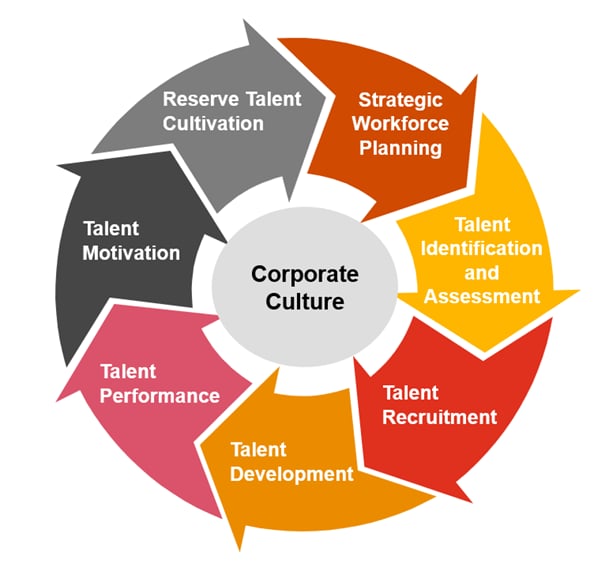Talent is increasingly becoming a valuable resource for organisations to maintain a sustainable competitive advantage. However, many companies face a number of challenges in talent managements:
- A rapidly growing business with a shortage of available talent and a lack of established methodologies for systematic talent planning to support strategy implementation and business development.
- The competency model and job qualification system are not being able to effectively identify and assess talent.
- Incomplete talent career development paths and training systems that hinder the upward mobility of professional talent within the organisation.
- The performance system does not provide meaningful and effective support for strategy implementation.
- The difficulty of determining salary adjustments due to high labour costs.
- Failure to attract, motivate, and retain talent with short-term incentives such as wages and bonuses, without considering long-term incentives.
- Without a clear understanding of core talent and the potential successors, forming a talent ladder to support organisational development can be challenging.
- While it is recognised that corporate culture helps to build a sustainable business, there is no clear understanding of how to systematically build, enhance and implement it.
PwC helps companies to systematically improve talent management and achieve key breakthroughs by providing well-established models, mature methodologies, and extensive experience in each sub-module of talent management.
Our Capabilities
PwC Talent Management Model

PwC's Strategic Workforce Planning (SWFP) methodology can drive HR planning by identifying key organisational capabilities, analysing the relationship between various positions and organisation capabilities and identifying the key positions and capabilities required. The model enables companies to plan the number, structure and skill requirements of the talent needed to support development, and to identify the core talent gap by key job classifications, positions and skill requirements.
Build a competency model and job qualification system to effectively identify and assess talent.
Competency model:
Build a competency model at three levels: core corporate quality, leadership quality and professional capabilities.
Job qualification system:
Develop a job qualification framework that includes basic job requirements, professional knowledge and technical capabilities, etc. For professional capabilities, make full use of strategy derivation, high performing behavioural decoding, industry practice studies and PwC capability cards to achieve fast modelling. Define the basic qualifications for each position at each level, establish the organisational structure and work processes for assessment and development, and create a comprehensive job qualification management system.
Talent assessment:
Assess and analyse core talents from three dimensions: professional quality assessment, leadership assessment and job matching.
Working with companies to recruit talent, we provide services such as talent profiling, candidate assessment and competitive recruitment.
Talent portrait:
Clarify the educational background, professional knowledge and skills, professionalism, and experience required for each position level based on its core responsibilities and hierarchical description. This will help identify screening criteria for job applications and interviews during the recruitment process.
Candidate assessment:
Assist companies effectively assess candidates for executive positions using tools such as the Leadership Qualities Model and supporting them in their decision-making process.
Talent competitive recruitment:
Decompose the required ‘soft skills’ and ‘hard skills’ based on the company’s strategic development objectives, and establish internal competitive recruitment criteria using the company’s performance assessment system.
Establish a career development plan for employees and empower them through effective training.
Career development path for talent:
Optimise the career development system to expand employee development opportunities and help employees define their career development plans to achieve mutual growth for both employees and the company.
Training:
Design training topics based on the key capability requirements for each job classification to address current management pain points. Develop corresponding training maps and further refine the curriculums.
Build a talent-friendly platform and effectively assess talent performance.
Establish a balanced score card performance indicator system that translates corporate strategies into employee behaviours and ensures strategy implementation.
Establish a closed-loop performance management system that includes a continuous four-part cycle of performance planning, feedback and coaching, performance assessment and results application to achieve the business strategy. This will help to establish a performance management guarantee system that features a performance management organisation, a management cycle and process, and relevant forms.
Pay talent fairly and appropriately, improving the benefits system and building effective short and long-term incentive mechanisms.
Compensation:
Based on the ‘Total Compensation’ concept, design a fair distribution plan for both cash compensation and long-term incentives, taking into account the competitive salary analysis, salary strategy and salary structure design. Determine the salary strategy for different position types and highlight the incentive focus based on differentiated salary positioning and optimisation direction, while designing an appropriately ratio of fixed and variable salary and bonus distribution plan.
Long-term incentive:
We provide ‘one-stop’ long-term incentive consulting services including HR, tax, legal, trust establishment and other services. With the accumulated experience in serving hundreds of A-share, Hong Kong Stock Exchange and NASDAQ listed or to-be-listed Chinese companies, we maintain a long-term incentive research database with deep understanding of market trends and have established good relationships with relevant government institutions.
Partnership mechanism:
In response to the trend of corporate transformation and talent entrepreneurship in the new normal, we propose a partnership business model that emphasises joint business operation and sharing of benefits and risks. This model replaces the traditional employment-based management mechanism and meets the needs of both companies and core talents to achieve a win-win outcome. We help companies strengthen their core management team by designing partnership management and benefit distribution mechanisms.
Establish a reserve talent cultivation plan to develop and provide growth opportunities for core talent.
The key to reserve talent development is to establish a mechanism for identifying and developing a ladder of core professional and management reserve talent, including screening, assessment and selection. We will strengthen the construction of the three teams (leadership team, professional team and management team) and form the reserve talent team in line with the company’s strategy and talent development needs. We will clarify the development paths of top talents and follow the ‘721’ rule of learning, systematically strengthen the training of reserve talents, and optimise the talent reserve mechanisms to ensure that the talent pipeline is well-filled.
Establish an organisational culture based on the corporate culture concept system and implement systematic planning that focuses on ‘knowledge, belief, action, assessment, improving and sharing’ of culture. We provide corporate culture solutions through the following steps:
Corporate DNA diagnosis:
Use the corporate DNA culture questionnaire to understand the communication style within the company and guide the company in adopting better communication approaches to achieve the required changes in corporate culture.
Corporate culture design and co-creation:
Collaborate with the company to summarise the core elements of the corporate culture through interviews and workshops, including the culture system structure, content description and connotation definition. Finally, create a concise and understandable corporate culture manual.
Corporate culture implementation plan:
Design a culture implementation plan by designing implementation methods, clarifying implementation responsibilities, and determining the implementation schedule through workshops, employee intent surveys, and other means.
Corporate culture integration support:
Integrate corporate culture into HR management by building employee capability models and integrating culture content into employee assessments through joint working groups and other methods.
Our past experiences
In recent years, PwC has provided talent management services to many leading companies, including system improvements across multiple modules, and breakthroughs to address current pain points.









